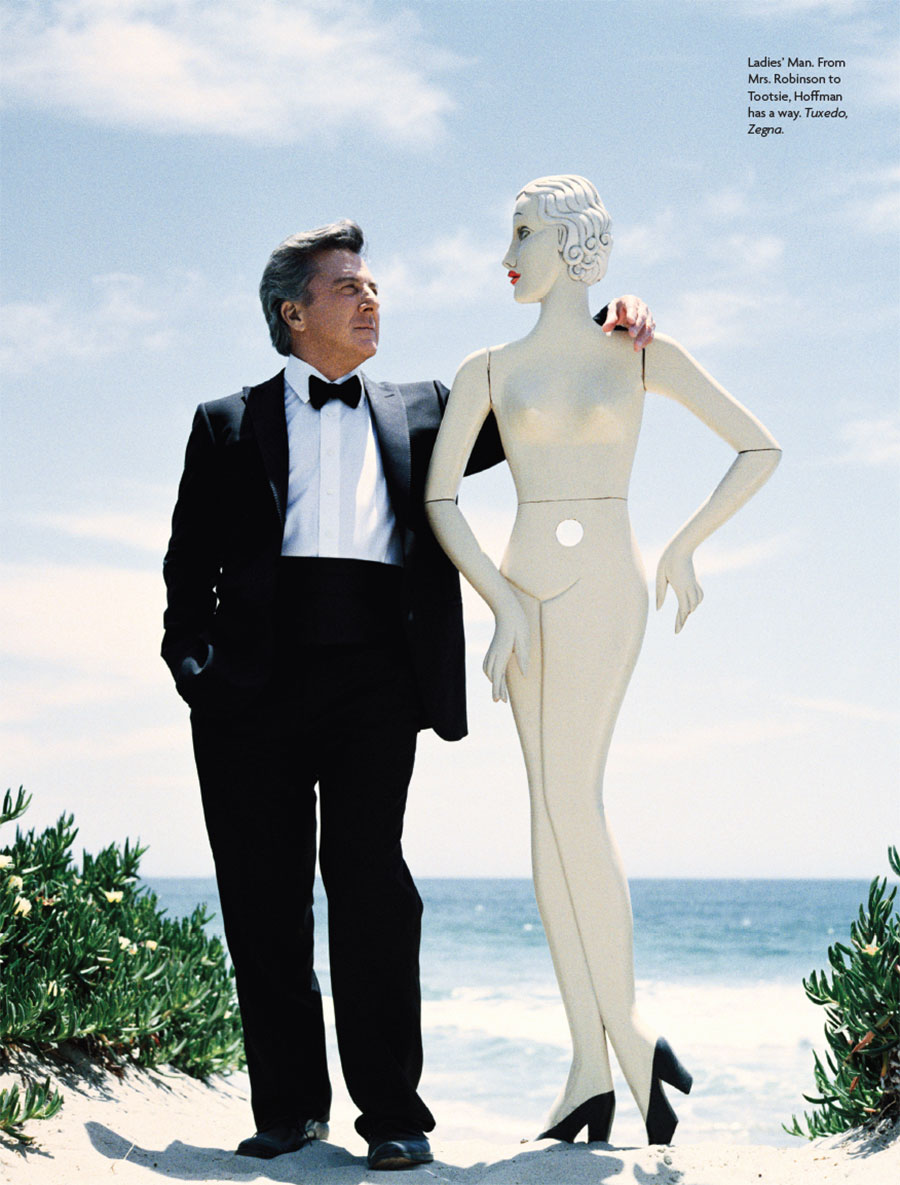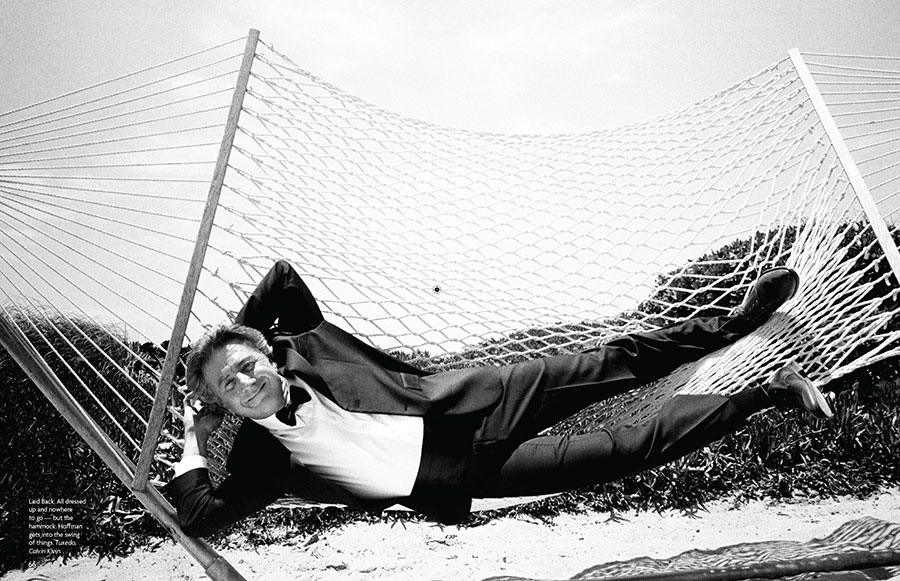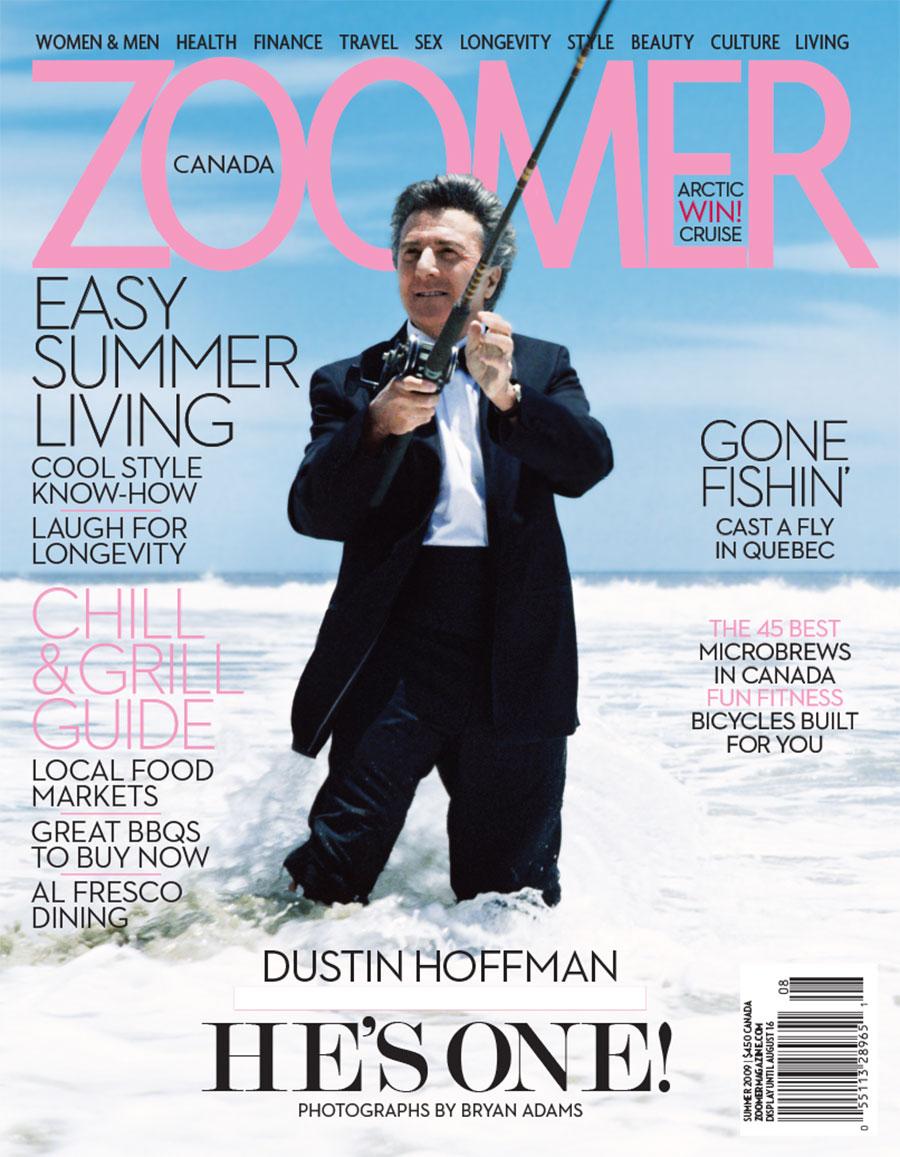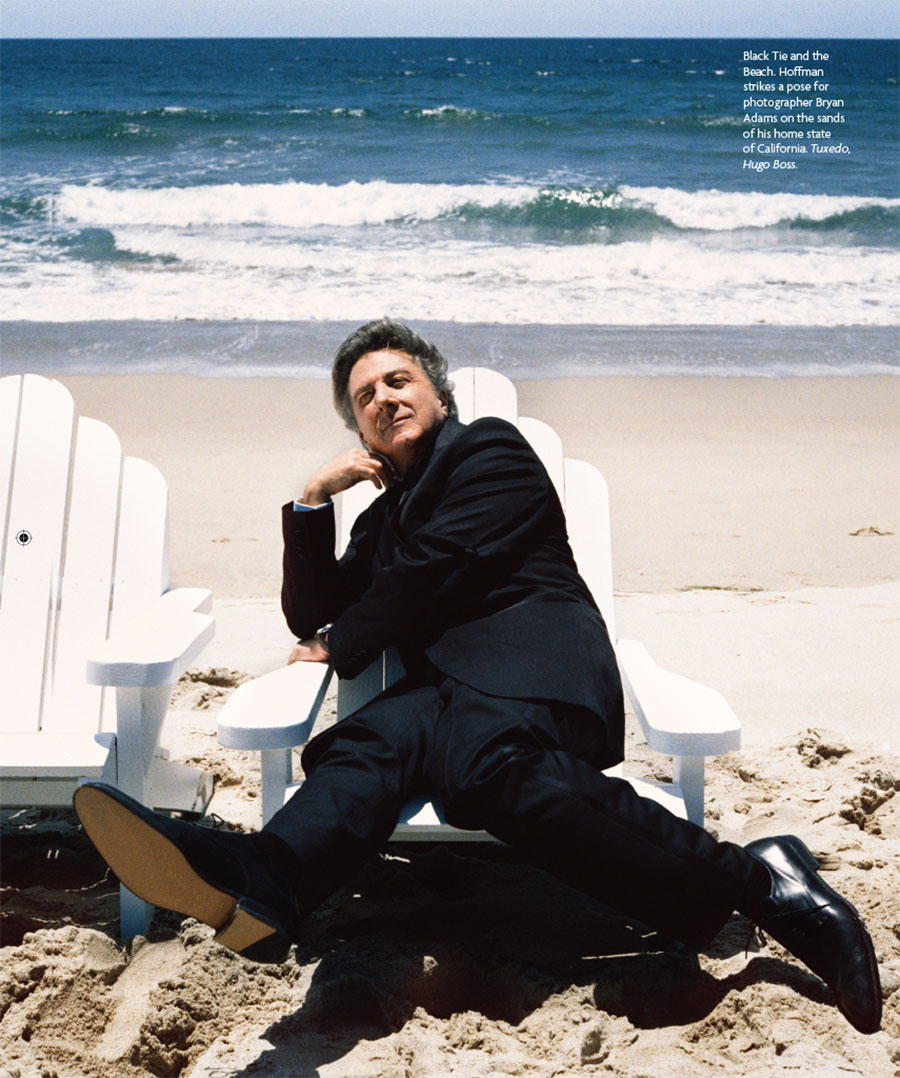Dustin Hoffman On His Creative Marriages, Musical Background and Defying Hollywood Clichés

Photo: Bryan Adams
Showbiz is in Dustin Hoffman’s blood. His father worked at Columbia Studios in props and set dressing before shifting to furniture design, where he launched his own short-lived store, Harry Hoffman Furniture Company. His mother, Lillian, was a former jazz pianist and set him up with a piano and a teacher at the age of five. But, before Hoffman hit the silver screen, the Los Angeles native harboured dreams of becoming a jazz musician while studying piano. He gave up music in his late teens to try something else. Something like, let’s say, janitor, attendant at a psychiatric institution, demonstrator in Macy’s toy department, dishwasher, typist, waiter, director, producer, writer and, of course, actor.
With two Oscars, five Golden Globes and a Cecil B. DeMille award bestowed upon him by the Hollywood Foreign Press, there’s no doubt about actor. Did we mention husband, father of six and grandfather of three? Up next, Hoffman’s signed to play the belligerent patriarch Izzy in the Toronto-based Serendipity Point Films’ adaptation of Mordecai Richler’s Barney’s Version, alongside Paul Giamatti, and may also reprise his Meet the Fockers role. His latest movie, Last Chance Harvey, out now on DVD, explores a lonely, long-divorced New Yorker who travels to England for his distant daughter’s wedding, only to be greeted as an outsider. Through a series of snafus, he meets and falls for a 50-something airport employee, played by Emma Thompson, proving it’s never to late to find love.

Dagmar Dunlevy: Society through media, film and television tends to depict that falling in love doesn’t seem to happen for people over a certain age. Does love really change, become different, deeper?
Dustin Hoffman: Well, you can wait more than 24 hours to jump in the sack, I guess, be more patient.(smiling) The value of courtship increases. Maybe it’s not true in Europe. They have more romantic films with people over 30, don’t they? The old days with Romy Schneider and Yves Montand, doesn’t that still exist? It’s here in this youth-obsessed culture [where it’s not the case]. They don’t see any money in it, but they should take another look because, from what I understand, for the first time the majority of the audience is over 40 now
DD: Your co-star, Emma Thompson, said she fell semi-in love with you. She did add, however, that she didn’t want to live with you. What are you like to live with?
DH: A handful! (grinning) First of all, I don’t want to live with her. We’re creatively married. We met on Stranger Than Fiction, and that’s why we wanted to work together again. It’s an extraordinary feeling when we work with each other. Marriage should be that easy. It reminds me of when I started studying acting in New York at 21. I was on what was called a work scholarship, which meant I cleaned the toilets and they gave me free acting classes. The other person on a scholarship was Barbra Streisand, so that’s when we met.
Barbra and I never really became friends, and years would pass and we’d bump into each other, never really socializing, just seeing each other. Then, finally, we’re going to work on Meet the Fockers, and I said to Barbra on the first day of shooting: “Why didn’t we ever get married?” She looked at me without missing a beat and said, “Because we would have killed each other!” (laughs) I think a law should be passed in terms of actors: they should not be allowed to marry. You need one alpha and one beta, not two alphas. But it’s hard to be objective when you’re eternally subjective. My kids tell me that when I did Fockers, that that was the first time I acted the way I do at home! So, if you want to be married to that – (smiling)

DD: You have a passion for jazz.
DH: My father had a great love for it, and I remember listening to it a lot. A piano was put in front of me when I was about five. I don’t remember being asked, but my parents decided I was going to be a concert pianist. It is every Jewish family’s dream; you’re going to play Carnegie Hall!’ (smiling) I practised hard. I was going down twice a week to study at the Los Angeles Conservatory of Music but grew more distant from classical music. By the time I got into high school, it was the ’50s, and jazz, modern jazz, well, I fell in love with it.
DD: So what happened?
DH: I was in a band, and I was the worst one. I realized I was going to have a hard time because what the other guys in the band could do instinctively, I had to work very hard at. I was a bad student, [but] I started college as a so-called music major. I dropped out and took an acting class. I felt I would rather fail at acting than at music. I was sure I was going to fail, either way, but it was less painful to act than to sit at the piano. I didn’t like being alone. When you practise, it’s a hard thing. It’s just you and the piano. When you’re acting, at least you’re rehearsing with other people.
DD: There’s a theme of loneliness in Last Chance. How do you deal with loneliness?
DH: Wow! Is there a difference between being alone and being lonely? Yes. You can be lonely with people around. You can be lonely with the wrong person. At my stage, the best way I’ve found to deal with anything is to get as close to the truth as I can, and that cliché, the truth will free you, to find out why and the why is really hard — and then it’s not hard because when you finally find the answer to your own question, it was right in front of your face all the time, and you just didn’t want to see it. Lonely? I don’t know if you have a choice.

DD: You also wrote the tune you were playing at the piano in the film.
DH: I wrote it in my 20s, about the first girl that ever left me. It was in summer stock. We were going steady, and I thought I was going to marry her. We had the same acting teacher. The basement of the stage was where the actors would hang out because there was a piano there. I got there early, and there in the corner was my girlfriend, necking with my acting teacher! Classic. The song came out of that. Years passed, and Bette Midler asked me to be on her TV special. The song that I wrote came up, and I played it for her and she said she would write the lyrics. We did that on the show. Then Sting heard it, and he sang it while I played it at Carnegie Hall. My parents were dead by that point. They would have seen me play Carnegie Hall at Sting’s Rain Forest Benefit! It was a great thrill for me. It’s a good song. It’s called “Shoot the Breeze.”
DD: In this, you’re finally in a romantic boy-meets-girl type of film. Was your staying away from those roles intentional?
DH: Is that a cliché of the way people are leading men or leading ladies? I guess I always ran from trying to be that. I took a road less travelled, maybe in the sense that I was a character first and then let that lead to being a leading man, if the part called for it. But I never thought of myself as a leading man. Mike Nichols certainly didn’t when he cast me in The Graduate. He was roundly scolded by people. How could you cast him? He’s not a leading man! So I guess it all started with him, and now, suddenly, Emma and I, we looked at each other, and we say we played these so-called character roles most of our lives.
DD: You were making films in the ’50s, ’60s, ’70s, ’80s, ’90s and now the ’00s. If you had the power to revisit any of those decades –
DH: Right now, right now. I’m closer to myself now than I’ve ever been before. I’m loosening the demons that I have not ever been able to loosen. Ultimately, there’s two periods in your life. We like to call them three acts: youth, middle age and old age, but I think there’s only two. There’s one where we’re lucky enough to have our faculties, if you will, and then there’s that catastrophic event that happens to all of us, you know, knock on wood, where whatever that physical thing that happens that alters us and how we deal with it. I like life now, and I’m fortunate that that event hasn’t struck me yet. I’m at that little window of time where I feel like I finally found the first act of myself. Even if you’re lucky to have a career, family, money, there are crises that are lurking in all of us that I just feel that I am feeling. The hardest thing for many of us to feel is that we deserve a life.

DD: Speaking of life and the DVD, you’ve had your father-of-the-bride experiences.
DH: I was a father of the bride three times. The last one was my daughter Jenna, and that was quite wonderful. She married an Irishman, Seamus Culligan, no less, and I surprised them by getting Irish music for the event. I was trying to think of the closest thing to it, so I got a Scot to do the bagpipes and lead them out to the ceremony and back. It was memorable. (laughing)
DD: Can you share any memories from your own wedding?
DH: With my wife, Lisa [of nearly 30 years]. All her father gave me was a used Toyota in terms of a dowry. I’ve not forgiven him for that. It’s not funny! (smiling)
A version of this article appeared in the July/August 2009 issue.
RELATED:
The Look of Love: A Brief History of Romance on the Big Screen